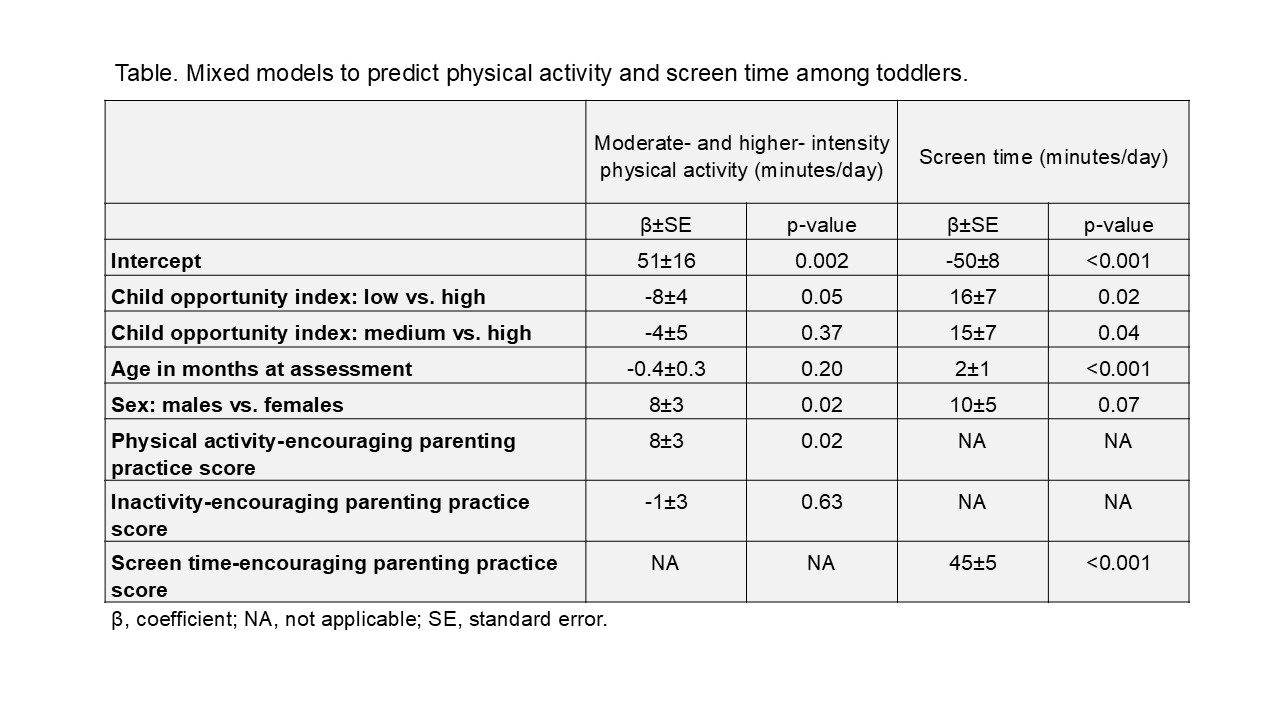Public Health & Prevention 3
Session: Public Health & Prevention 3
778 - Physical Activity and Screen Media Use in Toddlers and Related Parenting Practices
Monday, April 28, 2025
7:00am - 9:15am HST
Publication Number: 778.6152
Soyang Kwon, Northwestern University The Feinberg School of Medicine, Chicago, IL, United States; Selin Capan, Northwestern University The Feinberg School of Medicine, Chicago, IL, United States; Nidhi Gopagani, Northwestern University The Feinberg School of Medicine, Chicago, IL, United States; Sarah Welch, Northwestern University, Chicago, IL, United States
- SK
Soyang Kwon, PhD (she/her/hers)
Research Associate Professor
Northwestern University The Feinberg School of Medicine
Chicago, Illinois, United States
Presenting Author(s)
Background: Physical activity (PA) and screen media behaviors are key health-related behaviors in early childhood. Because these behaviors tend to track over time, it is important to establish healthy behaviors from a very young age. Knowledge on influences of parenting practices on the development of these behaviors in early childhood will inform family-based intervention strategies.
Objective: To investigate longitudinal trajectories of PA and screen time in toddlerhood and to examine associations between these trajectories and parenting practices.
Design/Methods: The study sample was Child and Mother PA Cohort Study (CAMPAS) participants. Child-mother dyads were recruited in the Chicago area in 2022-2024 and participated in assessments at baseline and 6 months. Children’s moderate- and higher-intensity PA (MPA) was evaluated using ActiGraph accelerometers. Mothers reported children’s screen time. Mothers completed the PA Parenting Practices for Preschoolers (PAPPP) questionnaire, which was used to calculate PA-encouraging, inactivity-encouraging (e.g., carrying, driving), and screen time-encouraging parenting practice scores (1=never to 5=always). Growth models were fit to model trajectories of MPA and screen time over age. Mixed effects models were used to predict MPA and screen time, including predictors of socioeconomic status, sex, and parenting practice scores.
Results: Among 139 child participants (74 females), average age was 13.6 months (SD=1.7) at baseline and 19.9 months (SD=1.7) at 6 months. MPA was 75 (SD=25) and 73 (SD=23) minutes/day at baseline and 6 months. Screen time was 28 (SD=46) and 45 (SD=49) minutes/day at baseline and 6 months. Growth models found an increase of 16 minutes (95% CI=9-23) in daily screen time over 6 months, but no significant change in MPA. Mixed models showed that one point increase in the PA-encouraging parenting practice score was associated with 8 minutes/day higher MPA (p=0.02). One point increase in the screen time-encouraging parenting practice score was associated with 45 minutes/day higher screen time (p < 0.001). The models also showed 8 minutes/day higher MPA (p=0.02) and 10 minutes/day higher screen time (p=0.07) among males than females.
Conclusion(s): We observed a significant increase in screen time during 6 months in toddlerhood. The significant associations between parenting practices and child PA and screen time suggest the importance of PA-encouraging and screen time-restricting parenting practices from a very young age for healthy development of PA and screen media use.
Mixed models to predict physical activity and screen time among toddlers.

Mixed models to predict physical activity and screen time among toddlers.


